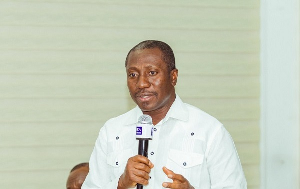?
A Member of Parliament is elected at national parliamentary elections to represent his/her constituents at parliament. Such elected persons, now called parliamentarians, are expected to be more effective in their multiple functions of representation. They have to be seen to play the role of legislating on behalf of the nation and their constituents.
?
When it comes to the distribution of the national cake (national development), they are to ensure their constituencies are not left out. This specific aspect is normally the work of the Municipal and District Chief Executives; it has however become the undefined duty of a parliamentarian. That is part of his effective oversight representation of his constituents.
?
Their effective participation in parliamentary debates on bills before enacting them into laws, contributions to, and propositions of, motions, as shown live on television or airwaves will enhance their image before, or in the eyes of, their constituents.
?
In the Western world or developed democracies, we see parliamentarians on their feet putting out motions and expressing their views on bills freely and in a mannerly order when authorised by the Speaker of Parliament to speak.
?
Some Parliamentarians can also be paid by lobbyists to speak on their behalf on the floor of parliament in support of their objectives be whatever they are. The MPs are seen to do the job for which they were elected. They also operate surgeries on certain days of the week or month when they meet their constituents on one to one basis to listen to their problems to help them secure solutions as best as they can.
?
?
?
If, in Ghana some parliamentarians are not permitted to speak for a reason or the other, then the Speaker of Parliament must please look into it to correct this erroneous situation. Some parliamentary whips or the Majority leader and Minority leader of Parliament may require or nominate members they trust to capably take their opponents on to speak all of the time. Should this be the case, justifying why some Members of Parliament never speak throughout the life time of a parliament, then it is wrong. It has to be addressed with immediate effect.
?
I think no-one is preventing my MP from rising to his feet to speak on behalf of his constituents. I shall very soon be putting this to test to see if the Majority and Minority Leaders in Parliament will prove obnoxious hindrances. I would love to see all MPs living up to expectation.
?
Some constituents do vote out their MPs for the fact that they did not hear them ever speak while in parliament for an entire four year- term period of parliament. What a disservice we shall be doing such MPs if their actions were not deliberate but forced upon them by other members of parliament – the Parliamentary Whips.
?
In an attempt to communicate my message with clarity to my readers, I will like to explain "Motion and Whip" as used above. Their definitions in quote are, "Motion (parliamentary procedure) - In parliamentary procedure, a motion is a formal proposal by a member of a deliberative assembly that the assembly take certain action. In a parliament, this is also called a parliamentary motion and includes legislative motions, budgetary motions, supplementary budgetary motions, and petitionary motions. Whip (politics) - A whip is an official in a political party whose primary purpose is to ensure party discipline in a legislature. Whips are a party's enforcers, who typically offer and threaten punishments for party members to ensure that they vote according to the official party policy. A whip's role is also to ensure that the elected representatives of their party are in attendance when important votes are taken. The usage comes from the hunting term whipping in, i.e. preventing hounds from wandering away from the pack".
?
Rockson Adofo
Opinions of Monday, 17 March 2014
Columnist: Adofo, Rockson














